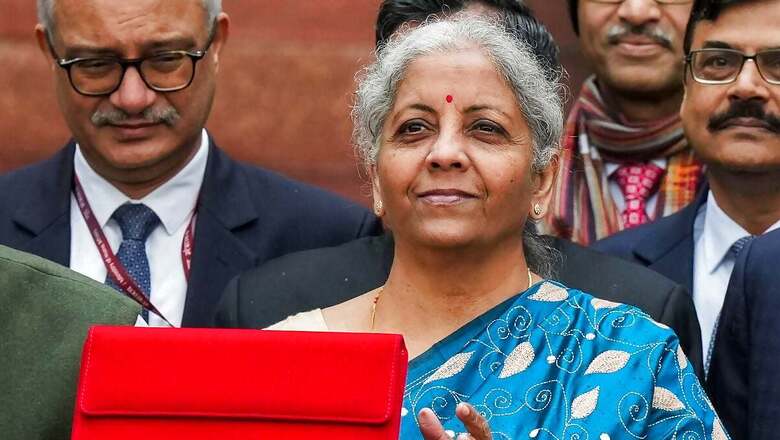
views
Even as the Indian economy remains the fastest-growing major economy in the world, economists said it will continue like this in future as well. In the Budget 2024, which Finance Minister Nirmala Sitharaman is set to present on July 23, the economists expect the government to ensure policy continuity, introduce reforms including ease of doing business, and demonstrate its commitment to fiscal consolidation and control on market borrowings.
Suman Chowdhury, chief economist & head of research at Accuite Ratings and Research, said, “While continuing its commitment to spending that will boost growth of the economy, the government is also expected to demonstrate its commitment to fiscal consolidation and control on market borrowings. In the current scenario, two important developments have taken place on the fiscal front: (i) higher-than-projected tax revenues in the first quarter of the year which may induce the government to increase its tax collection estimates (ii) substantially high dividend from the RBI of Rs 2.1 lakh crore.”
In the interim Budget 2024-25, the government had pegged the fiscal deficit of 5.1 per cent for the full fiscal. According to sources, the government might reduce it to 5 per cent in the full Budget 2024-25.
Additional capital inflows in the current year may support additional spending on welfare and also on capital expenditure, he added.
“At the same time, we expect the government to demonstrate its commitment to fiscal consolidation by not just sticking to the glidepath of a 4.5 per cent fiscal deficit by FY26 but also making an effort to improve on it. While the disinvestment programme of the government is uncertain at this point, we may see some measures to step up on asset monetisation,” Chowdhury said.
Sandeep Vampati, an economist with BJP, said the Union Budget 2024-25 must ensure policy continuity while introducing reforms including ease of doing business and climate change that would align with realizing the Vision of Viksit Bharat by 2047 as exhorted by Honourable Prime Minister Narendra Modi.
“In the near term, the continued higher share of capital expenditure will complement the RBI’s monetary policy in aligning the inflation to 4 per cent which can induce RBI in reducing interest rates. Consequently, interest rate sensitive sectors like housing and automobiles will see increased economic activity,” he added.
The fiscal policy in the medium term must aim to reduce poverty, create income earning opportunities, induce shift from agriculture to manufacturing and services, raise the share of manufacturing GDP, ensure positive real income growth, promote savings and consolidate fiscally, Vampati said.
R P Gupta, an industrialist and author ‘Turn Around India: 2020’, said the government should review export duty on minerals and other customs duties to promote exports.
He also urged the government to push green energy production. “Incentives on gobar gas plant shall provide cheaper fuel in rural area and reduce methane emission, which is 21 times of CO2 emission per cubic meter.”
Gupta also expects to government to maintain fiscal discipline and cut fiscal deficit.
India’s Current Economic Situation
The Indian economy has registered a GDP growth of 8.2 per cent CAGR over the 3-year period ending 2023-24. The Indian economy has been the fastest-growing large economy. This is attributable to the structural reforms initiated in the last decade and also aided by the supply side reforms initiated during the Covid times. Various agencies express their optimism that this momentum will continue in FY25 too with forecasts ranging from 6.6 per cent to 8 per cent.
“Overall, the Indian economy is expected to be the fastest growing economy among the large economies until 2030. The Indian economy’s nominal GDP is expected to surpass $7 trillion by 2030 while becoming the world’s third largest economy surpassing the German and Japanese GDP,” economist Vampati said.













Comments
0 comment